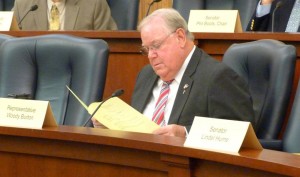Interim study committees are an integral part of the legislative process. They allow legislators the opportunity to conduct in-depth studies on critical issues facing Hoosiers across the state. In these committees, we receive public testimony and work out the details of proposed legislation before it is introduced in the 2014 session.
I am privileged to serve on the Pension Management Oversight Commission (PMOC). PMOC is charged with studying topics related to pensions, annuities and retirement benefits for public employees, teachers and public safety officers.
The commission has reviewed a variety of matters throughout our meetings this summer. They included the retiree health benefit systems of the Indiana State Police, the recent Indiana Public Retirement System (INPRS) Annuity Savings Account (ASA) changes and the Indiana Judicial Retirement System.
The commission also discussed whether we should endorse a voluntary municipal disability program for Emergency Medical Service workers and whether we should endorse a voluntary private sector state-assisted retirement plan. In addition, we debated whether certain public pension retirees, survivors and beneficiaries should receive cost-of-living adjustments (COLA) to their benefits or thirteenth pension checks.
At our final meeting this week, the commission made several recommendations to the General Assembly. One of recommendations was regarding post retirement benefit adjustments for members, survivors, and beneficiaries of the Public Employees’ Retirement Fund (PERF) and the Teachers’ Retirement Fund (TRF). The commission recommended that the General Assembly adopt a new formula for annual post retirement benefit adjustments for PERF and TRF. The formula takes both years of service and current annual benefits into account.
Another topic we discussed was Annuity Savings Accounts (ASAs) for PERF and TRF members. In July, the INPRS board voted to privatize ASAs offered to public employees and teachers. Under private management, which uses market rate, the interest rate would be considerably lower than being under INPRS management. Under INPRS, the accounts earned a fixed interest rate of 7.5 percent, which is well above market rates. The commission recommended that INPRS pursue an option that would keep the annuitization of ASAs in-house and not proceed with a third party contract. Instead, we recommended that INPRS periodically establish an interest rate that will not create an unfunded liability in their managed funds.
I look forward to further discussing these, and many more, matters before the General Assembly in January. The work accomplished in interim study committees lays the foundation for the upcoming session. As I wrap up my interim duties and anticipate the start of the 2014 session I would like to hear your feedback. Please feel free to contact me anytime by phone at 317-232-9863 or via email at h58@iga.in.gov.





